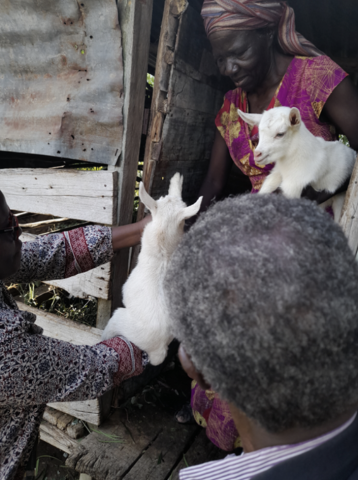Kenyan inventor’s eco-friendly product feeds dairy goat economy
Kenyan inventor’s eco-friendly product feeds dairy goat economy
In Kisumu County, Kenya, innovator Joe Ouko develops eco-friendly goat feed, boosting the dairy goat economy. Ouko's locally-led initiative showcases the integration of traditional wisdom and modern science in climate-resilient agriculture. This story is part of a series celebrating the locally-led solutions supported by the UNDP implemented - Adaptation Fund Climate Innovation Accelerator programme.
Joe Ouko experimented with local leaves, herbs and mineral salts to create an affordable, sustainable meal product for dairy goat keepers in Kisumu County.
The final product, known as LOFODA-G-Meal (Locally Formulated Dairy-Goat Meal), was created with the help of World Neighbours, an international development organisation that works to alleviate hunger, poverty and disease.
They say Ouku’s creativity and local knowledge has already boosted livestock productivity, which will have a positive influence on food security and local incomes.
“It is not only benefiting him as a person, but now even the local community. He has created a business engine; a vehicle for marketing the product,” says Vincent Mariadho, national coordinator of Prolinnova–Kenya, an initiative of World Neighbours. “He has managed to mobilise nine more people within this community-led business," he says.
Mariadho’s team used a grant from the Adaptation Fund and the European Union to boost local capacity for manufacturing LOFODA-G-Meal, and for dairy goat farming in general. The fund supports climate innovation in developing countries through its Adaptation Fund Climate Innovation Accelerator (AFCIA) programme.
“Using this funding, we have managed to mobilise the community to embrace dairy goat farming as an alternative source of revenue,” says Mariadho.
Joe Ouko is the local innovator who used sustainable plant materials and climate resilient strategies to create the LOFODA-G-Meal goat feed that can be replicated throughout the Kisumu County community in Kenya. Video courtesy of: Prolinnova.
Mariadho explains that other than livestock diseases, feed availability and quality is one of the biggest challenges facing farmers. He says Ouka’s LOFODA-G-Meal completes a local economic circle neatly in that it already has an immediate local market, and the farmers who use it have opened new income streams for themselves.
For example, Jane Jagero saw her goats’ milk production increase dramatically when they started eating the LOFODA-G-Meal feed. She has been a dairy goat farmer since 1999.
"Jane initially was actually raising indigenous goats, which would go off into the environment to feed on the local vegetation. Then in the evening, they were brought back home,” explains Mariadho.
“The production in terms of the milk was very low, and she was not keeping them for milk,” he says. In fact, he says Jagero previously thought one could only get milk from cows, when in reality the goats were simply not productive before.The project helped her acquire a new breeding stock of goats better suited to the local environment, and she fed them the locally-manufactured LOFODA-G-Meal.
“Since I have been using LOFODA, it has improved my production of milk and the rate at which the goats are growing much faster,” said Jagero, adding that she is making more money now. “In terms of production, before I was getting two litres but now I am getting three litres to three-and-a-half litres per day.”
Mariadho says the project also focussed on empowering marginalised groups such as women and youth, by providing work opportunities within the manufacturing pipeline of the goat feed.
“They are mobilised into production clusters where they also supplement the local vegetation that they harvest from the wild,” he says. They generate other products in this way to further boost their income.
The key to the success of the LOFODA-G-Meal product was recognising that local knowledge and scientific solutions can be integrated to build climate resilience.

"The kid you see in the picture is one of the very first kids that she got. She said she is now able to get milk from the goats, something she thought she could only get from cows" says Vincent Mariadho, national coordinator of Prolinnova–Kenya.
“[Indigenous] farmers are actually full of knowledge, but in most cases professionals have not tapped into this knowledge. These farmers have real solutions and practical knowledge based on their constraints," says Mariadho.
In recognition of this fact, his team also introduced community-based advisory services, where local experts share their insights and best practices around dairy farming.
Mariadho says this local Kenyan innovation shows that farmers are already adapting and innovating in the face of climate change; it is just a matter of finding these innovations, integrating other scientific knowledge and spreading the ideas further.
About this article:
This story has been co-created with the support of Prolinnova–Kenya, UNDP, CDKN, ICCCAD, and GRP, under the framework of the UNDP-managed Adaptation Fund Climate Innovation Accelerator (AFCIA).
The UNDP-AFCIA programme counts on financial contributions from the Adaptation Fund and the European Union and has awarded 44 micro and small grants to locally-led organisations across 33 countries worldwide, accelerating their innovative solutions to build resilience in the most vulnerable communities.
UNDP-AFCIA, is one of the funding windows anchored under the Adaptation Innovation Marketplace (AIM), a multi-stakeholder strategic platform that promotes scaled-up adaptation at the local level, launched by UNDP Administrator Achim Steiner at the Climate Adaptation Summit in January 2021.
